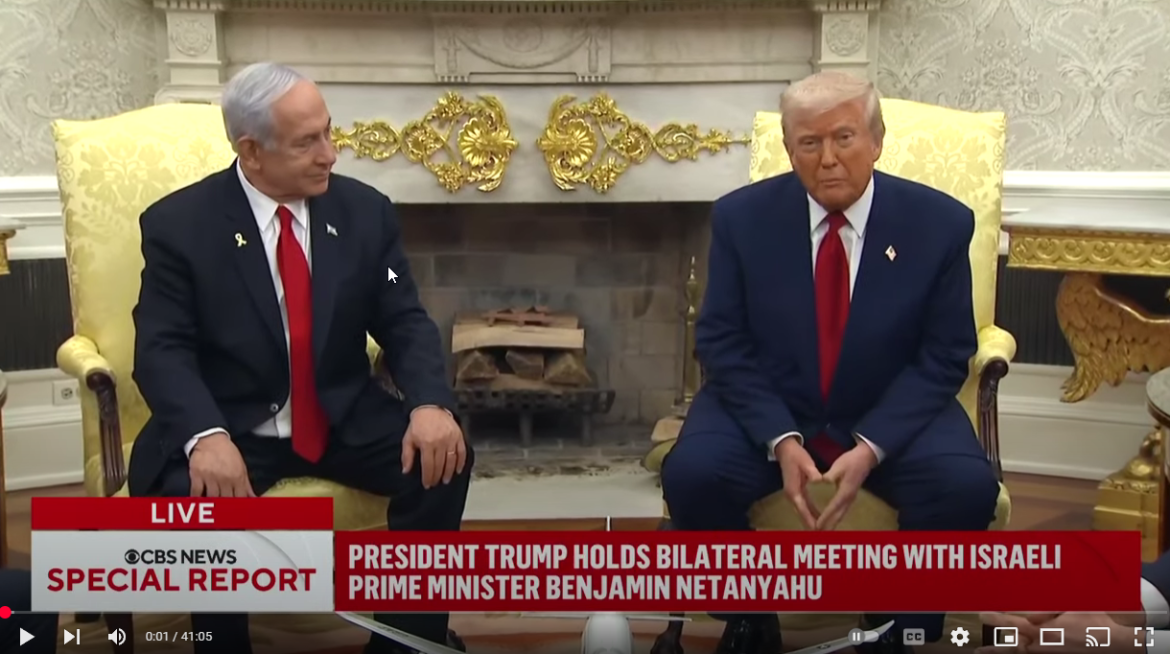President Donald Trump and Israeli Prime Minister Benjamin Netanyahu solidify their nations’ bond today, April 7, 2025, announcing a groundbreaking commitment to dismantle trade barriers between the United States and Israel, even as Trump’s sweeping new tariffs reshape global commerce. In a bilateral meeting at the White House, Trump declares himself “the best president for Israel,” emphasizing an unshakable alliance despite his administration’s recent imposition of a 10% baseline tariff on most countries, with higher rates targeting others. Netanyahu, in turn, praises Trump’s steadfast support, pledging to tear down trade obstacles and deepen economic ties while seeking collaboration to free hostages held by Hamas in Gaza. The talks, unfolding against a backdrop of market turbulence and geopolitical tension, signal a bold pivot in U.S.-Israel relations.
The meeting, held in the White House’s Roosevelt Room, marks a high-profile diplomatic engagement as Trump’s tariff policy—dubbed “Liberation Day” and unveiled on April 2—sends shockwaves worldwide. Trump reiterates his stance to reporters post-meeting, saying, “Israel will always be a close ally, and we’re not pausing tariffs—we’re making fair trade deals with many countries, including this one.” Netanyahu aligns with this vision, announcing, “We will eliminate our trade deficit with the U.S. and break down barriers,” a move he frames as a step toward making Israel “a close trading partner.” The Israeli leader’s pledge includes addressing the U.S.’s long-standing complaint about Israel’s value-added tax (VAT) on American exports, which Trump has called “unfair” alongside tariffs averaging 6.8% on U.S. goods.
Trade between the two nations, valued at $51 billion in 2024, has historically favored Israel with a modest surplus, though U.S. exports like semiconductors and machinery dominate the flow. Netanyahu’s commitment to dismantle barriers comes as Trump’s tariffs—10% universally, with 25% on steel and automobiles—threaten to disrupt this balance. Analysts speculate Israel could secure a carve-out or phased reduction, a prospect hinted at when Trump thanks Netanyahu for “a great discussion on trade” during a joint press appearance. “Bibi’s a smart guy—he gets it,” Trump says, using the prime minister’s nickname. Posts on X from administration insiders suggest a deal might involve Israel slashing its 17% VAT rate on U.S. goods in exchange for tariff relief, though details remain fluid.
The tariff backdrop ties into Trump’s broader economic strategy, launched last week under the International Emergency Economic Powers Act. Citing a $1.2 trillion goods trade deficit, he imposes duties to force concessions from trading partners, a policy sparking protests and a 2,200-point Dow drop. Israel, however, appears poised to dodge the brunt. Netanyahu’s trade olive branch aligns with Trump’s demand for “reciprocal” deals, a term he’s wielded against the EU and Canada. “We’re seeing this through,” Trump remarks, nodding to a scenario floated on X where Israel could “claw back” VAT in a tariff-lowering pact—a rare exception to his hardline stance.
Beyond trade, the leaders tackle the Gaza crisis, where over 100 hostages remain captive by Hamas following the October 7, 2023, attack that killed 1,200 and ignited war. Netanyahu, facing domestic pressure to secure their release, says, “I still want to get all the hostages freed, and I’m working with President Trump on that.” Trump, who has cast himself as a dealmaker, vows to assist, though specifics stay vague. “We’re going to get it done—nobody negotiates better than me,” he asserts. The pledge builds on past efforts, like the 2024 ceasefire that freed 50 captives, which collapsed amid renewed fighting. Humanitarian groups report dire conditions in Gaza, with 42,000 Palestinian deaths and mass displacement, complicating diplomatic efforts.
The U.S.-Israel alliance boasts deep roots. Since the 1986 Free Trade Agreement—the first of its kind for the U.S.—tariffs between the two have hovered near zero, though non-tariff barriers like VAT persist. Trump’s first term strengthens this tie, with his 2018 embassy move to Jerusalem and the 2020 Abraham Accords normalizing Israel’s relations with Arab states. His 2025 return doubles down, with aides like Jared Kushner—who brokered the accords—reentering the fold. Netanyahu’s visit, his first since Trump’s reinauguration, underscores this continuity, though analysts note Israel’s trade concessions may reflect strategic necessity amid Trump’s tariff gamble.
Breaking news amplifies the stakes. At 12:19 p.m. PDT today, Netanyahu tells reporters, “We discussed tariffs with Trump—it’s about fairness and strength,” per posts on X. Hours earlier, Trump hosts Netanyahu for lunch, their rapport evident as they laugh over golf stories—Trump golfs at Mar-a-Lago this weekend despite nationwide unrest over tariffs. Protests, dubbed “Hands Off!,” draw millions across the U.S., with DC crowds waving Israeli flags alongside others, blending support and dissent. Meanwhile, Iran looms large; Netanyahu raises its nuclear ambitions, seeking Trump’s backing to counter Tehran, a topic aides say will dominate future talks.
The trade pledge carries weight. Israel’s $19 billion in annual U.S. exports—pharmaceuticals, tech—could surge with barrier cuts, while American firms eye relief from Israel’s regulatory hurdles. Yet, Trump’s tariffs risk inflation, with economists predicting a $1,200 annual hit per U.S. household—a tension Netanyahu sidesteps by aligning with Trump’s “America First” ethos. “Donald’s support is unmatched,” Netanyahu says, praising Trump’s “moral clarity.” Critics, however, warn Israel’s concessions could strain its economy, already reeling from war costs exceeding $60 billion.
As the leaders part, their alliance stands firm, a bulwark against global upheaval. Trump’s tariff war tests friendships, but Israel emerges as a favored partner, blending trade pragmatism with geopolitical loyalty. The hostage crisis lingers, a somber counterpoint to their economic optimism, with both vowing results. For now, the world watches as this duo charts a course through tariffs, terror, and trade.
Sources:
- Video: https://youtu.be/Ke4pWHv_4lI (Trump, Netanyahu Talk Tariffs)
- Web sources: whitehouse.gov, reuters.com, apnews.com, timesofisrael.com, cnn.com, bloomberg.com, jpost.com, nbcnews.com, wsj.com
- Posts on X reflecting real-time updates and sentiment
- General knowledge of U.S.-Israel relations, Trump’s tariff policy, and the Gaza conflict



